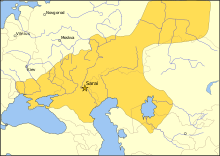Edigu's Campaign of Moscow
| Edigu's Campaign of Moscow | |||||
|---|---|---|---|---|---|
 | |||||
| |||||
| Belligerents | |||||
|
| Principality of Moscow | ||||
| Commanders and leaders | |||||
|
|
Vladimir Serpuhovsky | ||||
| Strength | |||||
| Unknown | Unknown | ||||
| Casualties and losses | |||||
| Tiny | Heavy | ||||
Edigu's Moscow Campaign was a campaign led by Edigu Mirza which ended with the devastation of several Russian cities and the conclusion of a truce with Moscow without storming the city.
Before
[edit]The fact that Moscow stopped paying taxes did not escape the attention of Edigu Mirza, who succeeded Toktamish Khan to the throne of the Golden Horde. Edigu decided to launch a campaign against Moscow in 1408. Edigu Mirza believed that the success of the campaign in Toktamysh Khan's time lay in keeping it secret. Therefore, he sent an envoy to Moscow to inform them that he was going on an expedition against Lithuania. But in fact, this army he was preparing was going to march on Moscow. Another similarity of the campaign with Toktamysh's campaign was that Vasiliy II, the Knez of Moscow, fled to Kostrama, just like his father had done. The commander in Moscow, Vladimir Serpukhovsky, was tasked with rallying the people.[1][2]
Campaign
[edit]Edigu captured the cities of Pereyaslavl, Rostov, Dmitriyev and Serpukhov on the way. On November 30, he arrived at the gates of Moscow. Edigu sent an envoy to Moscow, saying that he would spend the winter there, that the gates of Moscow would be held and the people of Moscow would starve to death. The people, who had not forgotten the consequences of Toktamysh's campaign, declared that they would accept all the Khan's conditions.[1] As a result, the people of Moscow paid 3000 silver rubles and were saved from Edigu's attack. In the winter of 1408 Edigu returned to his homeland. Although Edigu did not take Moscow, he wreaked havoc in most parts of the knedom and put Moscow in a difficult economic situation. The Russian knedoms were taxed again. As a success, Vasiliy's army was spared a major blow.[3]
